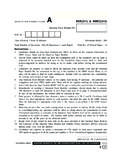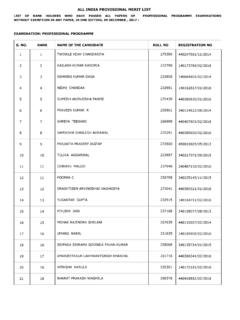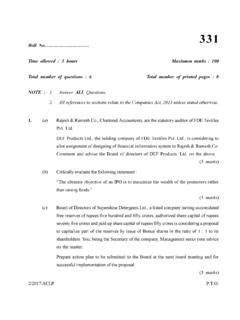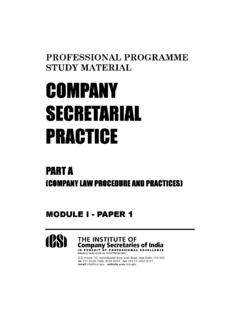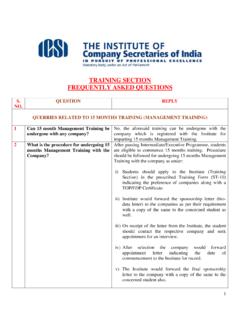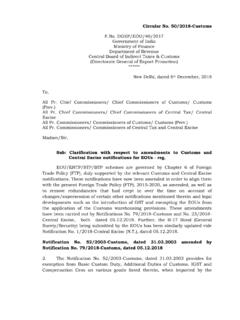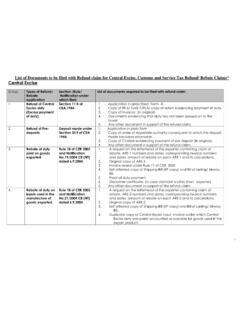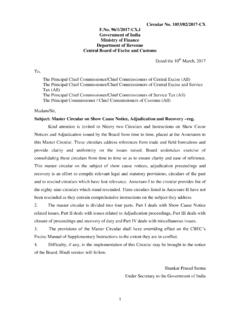Transcription of APPOINTMENT & REMUNERATION cover - ICSI
1 COMPANIES ACT, 2013 BACKGROUNDERAPPOINTMENT ANDAPPOINTMENT ANDAPPOINTMENT ANDAPPOINTMENT ANDAPPOINTMENT ANDREMUNERREMUNERREMUNERREMUNERREMUNERAA AAATIONTIONTIONTIONTIONOFOFOFOFOFKEY MANAKEY MANAKEY MANAKEY MANAKEY MANAGERIALGERIALGERIALGERIALGERIALPERSON NELPERSONNELPERSONNELPERSONNELPERSONNELI ntroductionThe executive management of a company is responsible for theday to day management of a company. The companies Act, 2013 hasused the term key management personnel to define the executivemanagement. The key management personnel are the point of firstcontact between the company and its stakeholders. While the Boardof Directors are responsible for providing the oversight, it is the keymanagement personnel who are responsible for not just laying downthe strategies as well as its XIII of the Companies Act, 2013 read with Companies( APPOINTMENT and REMUNERATION of Managerial Personnel) Rules, 2014deal with the legal and procedural aspects of APPOINTMENT of KeyManagerial Personnel including Managing Director, Whole-timeDirector or Manager, managerial REMUNERATION , secretarial audit Managerial PersonnelThe Companies Act, 2013 has for the first time recognized theconcept of Key Managerial Personnel.
2 As per section 2(51) keymanagerial personnel , in relation to a company, means (i) the Chief Executive Officer or the managing director or themanager;(ii) the company secretary;(iii) the whole-time director;(iv) the Chief Financial Officer; and(v) such other officer as may be DirectorSection 2(54) of the Companies Act, 2013, defines managingdirector . It stipulates that a managing director means a directorAPPOINTMENT AND REMUNERATION OFKEY MANAGERIAL PERSONNEL1 APPOINTMENT and REMUNERATION of Key Managerial Personnel2who, by virtue of the articles of a company or an agreement with thecompany or a resolution passed in its general meeting, or by its Boardof Directors, is entrusted with substantial powers of management ofthe affairs of the company and includes a director occupying theposition of managing director, by whatever name explanation to section 2(54)
3 Excludes administrative acts of aroutine nature when so authorised by the Board such as the power toaffix the common seal of the company to any document or to drawand endorse any cheque on the account of the company in any bankor to draw and endorse any negotiable instrument or to sign anycertificate of share or to direct registration of transfer of any share,from the substantial powers of Time DirectorSection 2 (94) of the Companies Act, 2013 defines whole-timedirector as a director in the whole-time employment of the 2(53) of the Companies Act, 2013 defines manager asan individual who, subject to the superintendence, control and directionof the Board of Directors, has the management of the whole, orsubstantially the whole, of the affairs of a company, and includes adirector or any other person occupying the position of a manager, bywhatever name called, whether under a contract of service or Executive Officer & Chief Financial OfficerSection 2(18)/(19) of the Companies Act, 2013 defined ChiefExecutive Officer / Chief Financial Officer as an officer of a company,who has been designated as such by it.
4 Company SecretarySection 2(24) of the Companies Act, 2013 defines companysecretary or secretary means a company secretary as defined inclause (c) of sub-section (1) of section 2 of the Company SecretariesAct, 1980 who is appointed by a company to perform the functionsof a company secretary under this Act; APPOINTMENT of Managing Director, Whole-Time Directoror ManagerSection 196 of the Companies Act, 2013 provides that no companyshall appoint or employ at the same time a Managing Director and aManager. Further, a company shall not appoint or reappoint any personAppointment and REMUNERATION of Key Managerial Personnel3as its Managing Director, Whole Time Director or manager for a termexceeding five years at a time and no reappointment shall be madeearlier than one year before the expiry of his 196(4) of the Companies Act, 2013 provides that subjectto the provisions of section 197 and Schedule V, a managing director,whole-time director or manager shall be appointed and the terms andconditions of such APPOINTMENT and REMUNERATION payable be approvedby the Board of Directors at a meeting which shall be subject to approvalby a resolution at the next general meeting of the company and bythe central Government in case such APPOINTMENT is at variance tothe conditions specified in Schedule V.
5 Approval of the CentralGovernment is not necessary if the APPOINTMENT is made in accordancewith the conditions specified in Schedule V to the , the APPOINTMENT of a managing director or whole-timedirector or manager and the terms and conditions of such appointmentand REMUNERATION payable thereon must be first approved by the Boardof directors at a meeting and then by an ordinary resolution passed ata general meeting of the notice convening Board or general meeting for considering suchappointment shall include the terms and conditions of suchappointment, REMUNERATION payable and such other matters includinginterest, of a director or directors in such appointments, if return in the prescribed form viz. is required to be filedwith Registrar within 60 days from the date of such 196(5) provides that subject to the provisions of this Act,where an APPOINTMENT of a managing director, whole-time director ormanager is not approved by the company at a general meeting, anyact done by him before such approval shall not be deemed to be with the Approval of central GovernmentIn case the provisions of Schedule V of the Companies Act, 2013are not fulfilled by company, an application seeking approval to theappointment of a managing director (Whole-time director or manager)shall be made to the central Government, in e-Form No.
6 Per section 200, the central Government or a company may,while according its approval under section 196, to any appointmentof a managing director, whole-time director or manager, the CentralGovernment or the company shall have regard to (a)the financial position of the company; APPOINTMENT and REMUNERATION of Key Managerial Personnel4(b) the REMUNERATION or commission drawn by the individualconcerned in any other capacity;(c) the REMUNERATION or commission drawn by him from any othercompany;(d) professional qualifications and experience of the individualconcerned;(e) such other matters as may be per Rule 6 for the purposes of item (e) of section 200, the CentralGovernment or the company shall have regard to the following matterswhile granting approval to the APPOINTMENT of managing directorunder section 196:(1) Financial and operating performance of the company duringthe three preceding financial years.
7 (2) Relationship between REMUNERATION and performance.(3) The principle of proportionality of REMUNERATION within thecompany, ideally by a rating methodology which comparesthe REMUNERATION of directors to that of other executivedirectors on the board and employees or executives of thecompany.(4) Whether REMUNERATION policy for directors differs fromremuneration policy for other employees and if so, anexplanation for the difference.(5) The securities held by the director, including options and detailsof the shares pledged as at the end of the preceding 196(3) of the Act makes a specific prohibitory provisionwith regard to the APPOINTMENT of managing director, whole timedirector or manager. The section lays down that no company shallappoint or continue the employment of any person as its managingdirector, whole time director or manager who (a) is below the age of twenty-one years or has attained the age ofseventy years:Provided that APPOINTMENT of a person who has attained theage of seventy years may be made by passing a special resolutionin which case the explanatory statement annexed to the noticeAppointment and REMUNERATION of Key Managerial Personnel5for such motion shall indicate the justification for appointingsuch person;(b) is an undischarged insolvent or has at anytime been adjudgedas an insolvent;(c) has at any time suspended payment to his creditors, or makes,or has at any time made, a composition with them.
8 Or(d) has at any time been, convicted by a court of an offence andsentenced for a period of more than six from this, Part I of Schedule V contains five conditions whichmust be satisfied by a person to be eligible for APPOINTMENT as managingdirector, whole-time director or manager without the approval of theCentral Government. These conditions are as below:(a) he had not been sentenced to imprisonment for any period, orto a fine exceeding one thousand rupees, for the conviction ofan offence under any of the following Acts, namely:-(i) the Indian Stamp Act, 1899,(ii) the central excise Act, 1944,(iii) the Industries (Development and Regulation) Act, 1951,(iv) the Prevention of Food Adulteration Act, 1954 ,(v) the Essential Commodities Act, 1955,(vi) the Companies Act, 2013,(vii) the Securities Contracts (Regulation) Act, 1956,(viii) the Wealth-tax Act, 1957,(ix)the Income-tax Act, 1961,(x) the Customs Act, 1962,(xi)the Competition Act, 2002,(xii) the Foreign Exchange Management Act, 1999,(xiii) the Sick Industrial Companies (Special Provisions) Act,1985,(xiv)the Securities and Exchange Board of India Act, 1992,(xv)the Foreign Trade (Development and Regulation) Act, 1992.
9 (xvi) the Prevention of Money Laundering Act, 2002; APPOINTMENT and REMUNERATION of Key Managerial Personnel6(b) he had not been detained for any period under the Conservationof Foreign Exchange and Prevention of Smuggling ActivitiesAct, 1974;Provided that where the central Government has given itsapproval to the APPOINTMENT of a person convicted or detainedunder sub-paragraph (a) or sub-paragraph (b), as the case maybe, no further approval of the central Government shall benecessary for the subsequent APPOINTMENT of that person if hehad not been so convicted or detained subsequent to suchapproval;(c) he has completed the age of 21 years and has not attained theage of 70 years:Provided that where he has attained the age of 70 years; andwhere his APPOINTMENT is approved by a special resolution passedby the company in general meeting, no further approval of theCentral Government shall be necessary for such APPOINTMENT ;(d) where he is a managerial person in more than one company,he draws REMUNERATION from one or more companies subjectto the ceiling provided in section V of Part II.
10 (e) he is resident in : For the purpose of above, resident in India includesa person who has been staying in India for a continuous periodof not less than twelve months immediately preceding the dateof his APPOINTMENT as a managerial person and who has cometo stay in India:(i) for taking up employment in India, or(ii) for carrying on a business or vocation in this condition shall not be applicable to the companies inSpecial Economic Zones, as may be notified by Department ofCommerce from time to , a person, being a non-resident in India, shall enterIndia only after obtaining a proper Employment Visa from theconcerned Indian mission abroad. For this purpose, such personshall be required to furnish, alongwith the visa application form,profile of the company, the principal employer and the termsand conditions of such person s of Managing DirectorUnder sections 196 and 203 of the Companies Act, 2013, APPOINTMENT includes reappointment.



